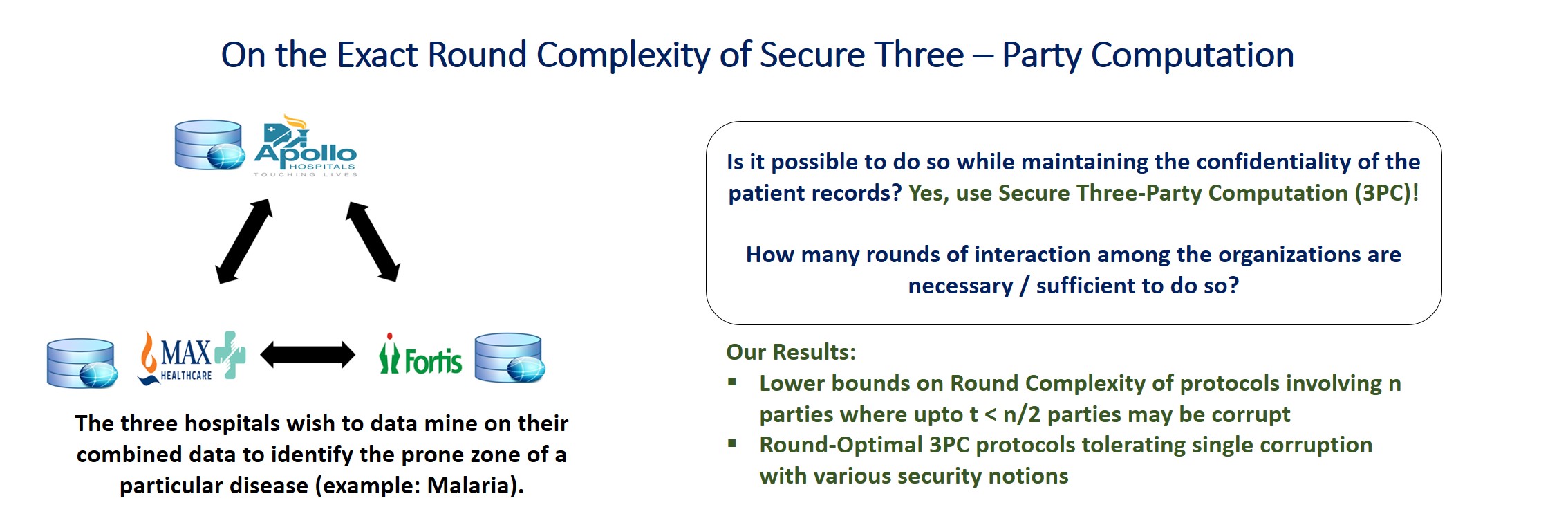This work was done by Prof. Arpita Patra and Divya Ravi and appears at CRYPTO 2018.
Secure multi-party computation (MPC) allows a set of mutually distrusting parties to jointly perform a computation on their inputs while keeping their inputs private. The study of 3-party setting is interesting as it presents many useful use-cases in practice. In this work, we settle the exact round complexity of three-party computation (3PC) protocols tolerating a single corrupt party, for a range of security notions such as selective abort, unanimous abort, fairness and guaranteed output delivery.
We focus on two network settings– pairwise-private channels without and with a broadcast channel. In the minimal setting of pairwise-private channels, 3PC with selective abort is known to be feasible in just two rounds, while guaranteed output delivery is infeasible to achieve irrespective of the number of rounds. Settling the quest for exact round complexity of 3PC in this setting, we show that three rounds are necessary and sufficient for unanimous abort and fairness. Extending our study to the setting with an additional broadcast channel, we show that while unanimous abort is achievable in just two rounds, three rounds are necessary and sufficient for fairness and guaranteed output delivery. Our lower bound results extend for any number of parties in honest majority setting. The fundamental concept of garbled circuits underlies all our upper bounds. Concretely, our constructions involve transmitting and evaluating only constant number of garbled circuits. Assumption-wise, our constructions rely on injective (one-to-one) one-way functions.
In more detail, we settle the exact round complexity of three-party computation (3PC) in honest-majority setting, for a range of security notions such as selective abort, unanimous abort, fairness and guaranteed output delivery. Selective abort security, the weakest in the lot, allows the corrupt parties to selectively deprive some of the honest parties of the output. In the mildly stronger version of unanimous abort, either all or none of the honest parties receive the output. Fairness implies that the corrupted parties receive their output only if all honest parties receive output and lastly, the strongest notion of guaranteed output delivery implies that the corrupted parties cannot prevent honest parties from receiving their output. It is a folklore that the implication holds from the guaranteed output delivery to fairness to unanimous abort to selective abort. We focus on two network settings– pairwise-private channels without and with a broadcast channel.
In the minimal setting of pairwise-private channels, 3PC with selective abort is known to be feasible in just two rounds, while guaranteed output delivery is infeasible to achieve irrespective of the number of rounds. Settling the quest for exact round complexity of 3PC in this setting, we show that three rounds are necessary and sufficient for unanimous abort and fairness. Extending our study to the setting with an additional broadcast channel, we show that while unanimous abort is achievable in just two rounds, three rounds are necessary and sufficient for fairness and guaranteed output delivery. Our lower bound results extend for any number of parties in honest majority setting and imply tightness of several known constructions.
The fundamental concept of garbled circuits underlies all our upper bounds. Concretely, our constructions involve transmitting and evaluating only constant number of garbled circuits. Assumption-wise, our constructions rely on injective (one-to-one) one-way functions.
